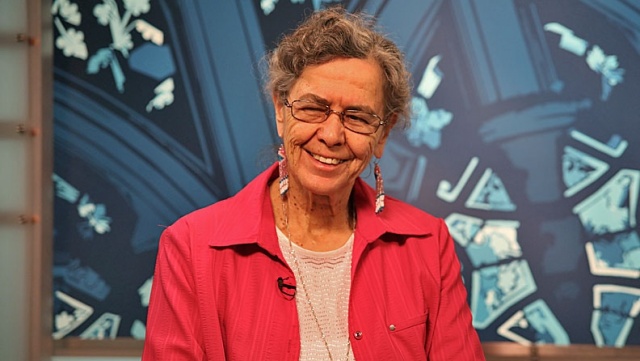

Indigenous and Catholic: Sr. Priscilla Solomon on Perspectives Weekly
Deacon Pedro
Thursday, June 2, 2016

Hope you can join us tomorrow, Friday, June 3 and Sunday, June 5 at 7pm and 11pm ET / 8pm PT.Learn more about these issues: Truth and Reconciliation Commission Catholic responses to Truth and Reconciliation Commission Call to Action 48 and questions regarding the “Doctrine of Discovery” Development and Peace supports the Truth and Reconciliation Commission Call to Action 48 and questions regarding the “Doctrine of Discovery” United Nations Declaration on the Rights of Indigenous Peoples More Resources: What is Reconciliation? What Is Reconciliation from TRC - CVR on Vimeo. Declaration on the Rights of Indigenous Peoples Declaration on the Rights of Indigenous Peoples from Melanie Nielsen Emonet on Vimeo.
Related Articles:
Category: Perspectives Weekly, Programming, Twitter
Tag: A Journey Toward Healing and Reconciliation, Aboriginal, Indigenous communities, Native People, Sr. Priscilla Solomon
Chaplaincy: “Divine Coffee” for Students
Tuesday, June 10, 2025
 Gianpaolo Capozzi
Gianpaolo Capozzi
Gianpaolo gives us a behind the scenes look at his upcoming Behold segment on the York University Catholic Chaplaincy.
Uncovering the Legacy of Fr. David Bauer: A Hidden Piece of Canadian History
Tuesday, March 4, 2025
 Alessandro Adorante
Alessandro Adorante
Priest, educator, and legendary hockey coach. Fr. David Bauer's impact on Canada's sports and culture history is unmistakable.
My Manresa Story: Resting a While
Monday, February 24, 2025
 Gianpaolo Capozzi
Gianpaolo Capozzi
At the Manresa Spiritual Renewal Centre in Pickering, ON, retreatants of all ages can encounter a God of surprises.
Consistory for the Creation of New Cardinals 2024
Friday, December 6, 2024
 Salt + Light Media
Salt + Light Media
On December 7, Pope Francis will hold a consistory for the creation of new Cardinals. Then on December 8, the Solemnity of the Immaculate Conception, he will preside over a Holy Mass of Thanksgiving with the new Cardinals.
How To Stay Awake During The Gospel Readings
Thursday, March 21, 2024
 Joseph McCullough
Joseph McCullough
As most longtime Catholics know, it’s easy to hear the Gospels repeatedly preached on Sundays, but not to understand, remember, or (consequently) truly value any of what you’d just heard.
SUPPORT LABEL
$50
$100
$150
$250
OTHER AMOUNT
DONATE










